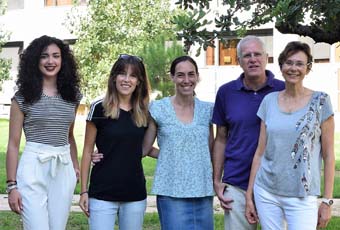
The Research Group Cell Cycle Regulation in eukaryotes of the Universitat de València has discovered that the protein Whi7 takes part in a new mechanism that acts as a negative regulator of Start, the most important control point of the start of cell division. The research has been published in the prestigious magazine ‘Nature Communications’ and it has been conducted with the S. Cerevisiae organism (bread, wine and beer yeast). It highlights the parallelisms between the start control mechanisms of proliferation in yeast and mammals, where the Whi7 role is played by proteins of the family of Retinoblastoma (Rb) tumour suppressor that are frequently mutated in cancer.
The major point in cell cycle control occurs at the end of G1phase in a process called Start in yeast and Restriction Point in mammalian cells. At this stage, cells decide to initiate or not a new round of cell division. That is why cells have sophisticated molecular mechanisms to control this key point of division. In particular, Start consists of a transcriptional program involving hundreds of genes and when it is activated a new cell division starts.
Given that the cell division is the basis of the life programming, the importance of this work lies in the fact that both the division of a cell or the non-division are crucial and that’s why to repress the transcriptional program Star is a key mechanism to stop the cell proliferation.
The molecular strategies in the cell cycle control are extraordinarily conserved in yeast and mammals. In this way, all eukaryotes cells block the start of the cell cycle and, thus, repressing the Start transcriptional program through repressor factors until the appropriate circumstances are met for proliferation. In this moment the transcriptional repressor is inactivated.
In this context, while in mammals some repressor proteins such as the Retinoblastoma ones (Rb, p107 and p130) have been described, until now in yeast there was only one known protein that plays that role, Whi5. In this work, the researcher team of the Universitat de València describes a new regulator important for this process, the protein Whi7.
Among the main conclusions of the study, it is highlighted that Whi7 is an unstable protein that works as a repressor of the Start transcription and that is able to substitute the Whi5 function. Thus, as in mammals, yeasts also rely on the existence of several transcriptional repressors to block the G1/S transition. ‘Yeast has been an important model for understanding the mechanisms of cell cycle control in more complex systems, including human cells’, says the director of the group, Juan Carlos Igual. `’The fact that a member of the Rb family is mutated in most cancers, gives special relevance to the study’, says Igual.
This research has originated the article «Whi7 is an unstable cell-cycle repressor of the Start transcriptional program», in which Mercè Gomar-Alba, Ester Méndez, Inma Quilis, M. Carmen Bañó and J. Carlos Igual, components of the Cell Cycle Group of the Department of Biochemistry and Molecular Biology of the Universitat de València and the Interdisciplinary Research Structure for Biotechnology and Biomedicine.
‘The nicest thing that this study teaches us is the elegance and robustness of the safety mechanisms used by the cell to control key decision points like Start’, says Mercè Gomar, the first author of the article. ‘This is reflected in the fact that both different proteins are required to perform the same function, as the same protein (Whi7) controls this function through two different ways’, she adds.
The research has been funded by the Ministry of Economy, Industry and Competitiveness, by the Prometeo project and with a pre doctoral contract ValI+D of the Valencian Government.
Cell Cycle Group
The Cell Cycle Group of the Interdisciplinary Research Structure for Biotechnology and Biomedicine conducts a basic research in one of the most interesting areas of molecular and cell areas, as it is the control of the cell cycle. Over the years, it has focused on different processes and has defined new control mechanisms of regulators of the cycle such as cyclins, repressors or transcriptional factors. Nowadays the group also works in the mechanisms of DNA integrity checkpoint, which is directly related with the development of cancer. In the last years they have characterised the checkpoint of genome integrity by the Protein kinase C (PKC).
Artículo:
Mercè Gomar-Alba, Ester Méndez, Inma Quilis, M. Carmen Bañó & J. Carlos Igual: «Whi7 is an unstable cell-cycle repressor of the Start transcriptional program». Nature Communications, 8: 329. DOI: 10.1038/s41467-017-00374-1
Link to article: http://ir.uv.es/T91PvoE
Last update: 5 de september de 2017 10:48.
News release


















